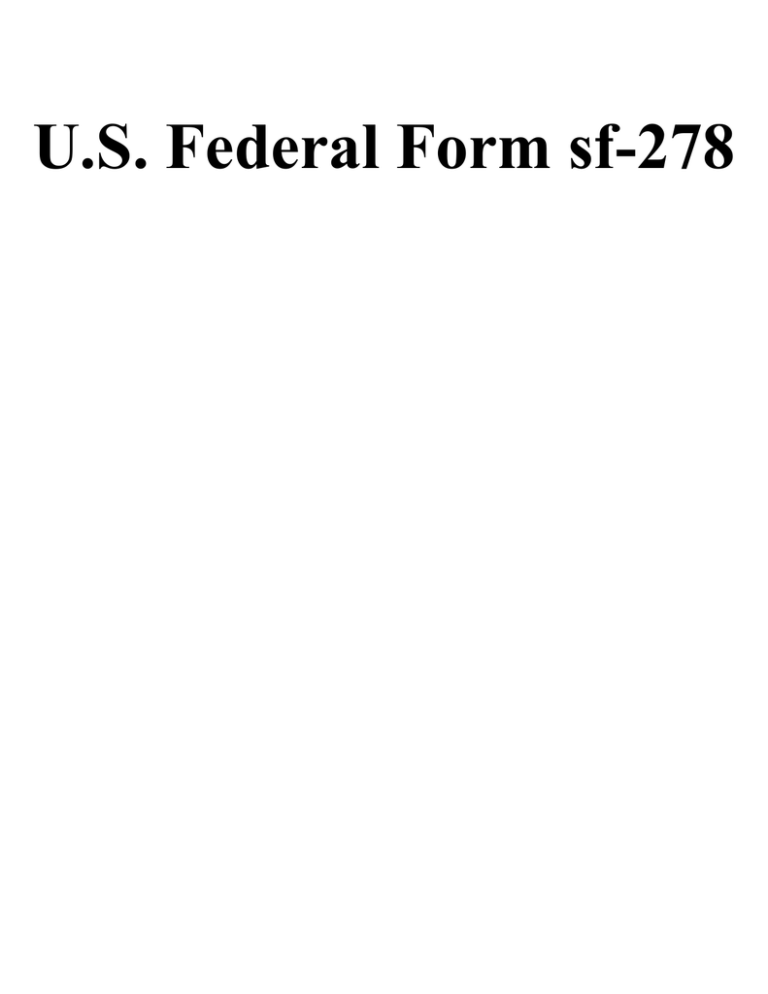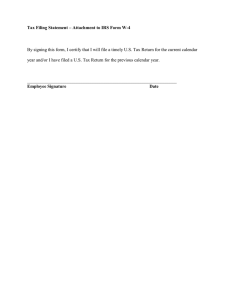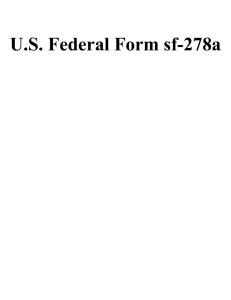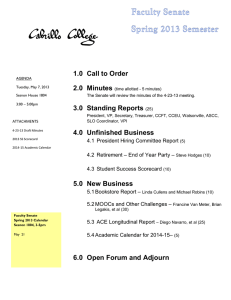U.S. Federal Form sf-278
advertisement

U.S. Federal Form sf-278 Standard Form 278 Executive Branch Personnel PUBLIC FINANCIAL DISCLOSURE REPORT Instructions for Completing SF 278 • Schedule C, Part II (Agreements or Arrangements) Show any agreements or arrangements as of the date of filing. • Schedule D - The reporting period is the preceding two calendar years and the current calendar year up to the date of filing. Scope of Disclosure I. Introduction Reporting Periods Incumbents: Complete Schedules A, B, C, and Part I of D. The reporting period is the preceding calendar year, except Part II of Schedule C and Part I of Schedule D where you must also include any positions held and agreements or arrangements made from the beginning of the filing year until the date you file. Schedule B need not include transactions made, or gifts or reimbursements received, during a period when the filer was not a Federal employee. Termination Filers: Complete Schedules A, B, C, and Part I of D. The reporting period begins at the end of the period covered by your previous filing and ends at the date of termination of Government employment in the position. Nominees, New Entrants and Candidates for Presi­ dent and Vice President: Complete Schedules A, C, and D (candidates do not file Part II of Schedule D), as follows: • Schedule A - The reporting period for income (BLOCK C) is the preceding calendar year and the current calen­ dar year up to the date of filing. Value assets in BLOCK B as of any date you choose that is less than 31 days before the date of filing. • Schedule C, Part I (Liabilities) - The reporting period is the preceding calendar year and the current calendar year up to any date you choose that is less than 31 days before the date of filing. The extent of the reporting requirement is noted in each schedule. The various schedules of this form require reporting of your financial interests and activities, both in the U.S. and abroad, except as otherwise noted. In addition to your individual financial information, you are required to report information concerning your spouse and dependent children in several schedules of the form. However, no report is required with respect to your spouse if he or she is living separate and apart from you with the intention of terminating the marriage or provid­ ing for permanent separation. In addition, no report is required with respect to any income or obligations of an individual arising from the dissolution of marriage or permanent separation from a spouse. There are other exceptions to the reporting of assets and income, transac­ tions, and liabilities of a spouse or dependent child which are discussed in the instructions applicable to those subjects. A basic premise of the statutory financial disclosure requirements is that those having responsibility for re­ view of reports filed pursuant to the Ethics in Govern­ ment Act or permitted public access to reports must be given sufficient information by reporting individuals concerning the nature of their outside interests and activi­ ties so that an informed judgment can be made with respect to compliance with applicable conflict of interest laws and standards of conduct regulations. Therefore, it is important that you carefully complete the attached form. This report is a safeguard for you as well as the Government, in that it provides a mechanism for deter­ mining actual or potential conflicts between your public responsibilities and your private interests and activities and allows you and your agency to fashion appropriate protections against such conflicts when they first appear. 1 A Presidential nominee to a position requiring the advice and consent of the Senate shall file with the Senate committee considering the nomination an amendment to the initial report, which shall update all items of earned income and honoraria through the period ending no earlier than 5 days before the scheduled date of the Senate committee hearing on the nomination. This up­ date shall be provided in the manner requested by the Senate committee considering the nomination. Copies shall be provided to OGE and your agency ethics official. Definition of Terms • Category of Amount Reportable financial interests are disclosed either by actual amount or by category of amount, depending on the interest, as specified by the form. You may, but you are not required to, indicate an actual amount where the form provides for a category of amount or value. • Dependent Child The term “dependent child” means your son, daughter, stepson, or stepdaughter if such person is either: (1) unmarried, under age 21, and living in your household, or (2) a “dependent” of yours within the meaning of section 152 of the Internal Revenue Code of 1986. • Excepted Investment Fund An excepted investment fund is a mutual fund, common trust fund of a bank, pension or deferred compensation plan, or any other investment fund, which is widely held; publicly traded (or available) or widely diversified; and under circumstances where you neither exercise control over nor have the ability to exercise control over the financial interests held by the fund. A fund is widely diversified when it holds no more than 5% of the value of its portfolio in the securities of any one issuer (other than the U.S. Government) and no more than 20% in any particular economic or geographic sector.


